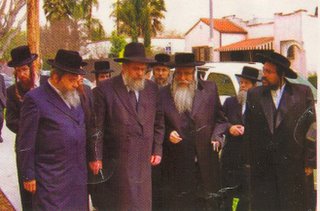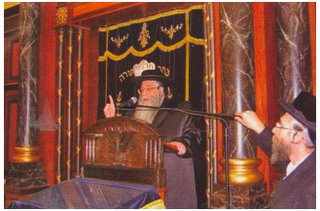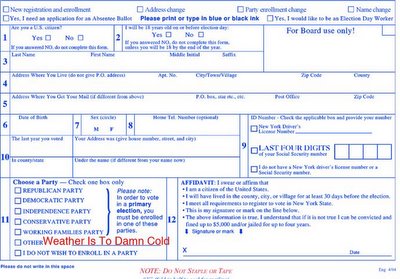 It was this week last year that the Klausenburg Rebbe from Israel visited LA for a shabbos and then on Sunday came by Yeshiva for a visit. the Klausenburg Rebbe spoke to the bochurem and afterwards all the bochurem under the orders of the Rosh gave "shulem" to the Rebbe.
It was this week last year that the Klausenburg Rebbe from Israel visited LA for a shabbos and then on Sunday came by Yeshiva for a visit. the Klausenburg Rebbe spoke to the bochurem and afterwards all the bochurem under the orders of the Rosh gave "shulem" to the Rebbe.Before the Rebbe left the campus he was given a free tour of the new campus by his own free tour guide; the Rosh himself. The tour included a close up view of the great water fall which is located in the Bais Hamedrash lobby, the outside courtyard and most importantly the beautifully mikveh. The report was that the tour of the mikveh was not the best decision since the strong and powerful smell of chlorine is unhealthy and could be damaging. The Rebbe had to cover his mouth and nose with his hands to protect himself from the almost toxic smell. This report was given over by a pair of unidentified mikveh chazonim who were in the wrong place at the wrong time and were forced to hide in the corner showers of the mikveh but were however zocheh to see this special part of the tour.
Below is a free translation of the Klausenburg Rebbe's sicha to the bochurem of Y.O.E.C.
Hanocheh Bilti Mugah MAMUSH!!!
Thank you Rosh Yeshiva for your warm words.
There is a Medrish in this weeks Parshah that says "Parshas Terumah was placed next to Mattan Torah", why does in fact the giving of the Torah precede Parshas Teruma?
Before we answer this question we must first explain something else.
In the beginning of parshas Yisro Rashi says "what news did Yisro hear that made him come [to the Jews in the desert]? Answers Rashi "[he heard] kriyas yam suf and milchemes Amolaik (the splitting of the see and the war with Amolaik)"
The question is known, why was it these two things that convinced Yisro to come? There where many other miracles that happened including the biggest one of all which is the actual leaving Metzrayim. for a slave to leave Metarayim was immposible, something that never happened before, (especially that this reason is actually written clearly in the torah).
many of the meforshim ask this question, or a similar one.
I heard the following answer from my father ZT"L (previous Klausenburg rebbe, who passed away summer 1994). We find two very different and opposite things in each of the two miracles that Yisro heard. Regarding kriyas Yam Suf it says Hashem tells moshe Rabeinu "why do you cry to me, speak to the Jewish children and journey! Which means why do you worry? There's no point in only praying and crying to g-d, what is needed from you is trust in hashem, that's all. On the other hand regarding Milchemes Amolaik the torah tells us that Moshe told Yehoshua to "choose men for war", meaning praying is not enough, we need to do action as well, we need to physically fight the enemy.
 Both (KRY"S and Amolaik) were wars and the enemys' intentions were to kill, in both situations the Jewish nation was physically endangered. however by one, all that was necessary was trust in hashem, and by the other the only way was to take physical action against the enemy. why?
Both (KRY"S and Amolaik) were wars and the enemys' intentions were to kill, in both situations the Jewish nation was physically endangered. however by one, all that was necessary was trust in hashem, and by the other the only way was to take physical action against the enemy. why?the explanation of this is as followes, by KRY"S the Metzreyim were upset that they freed the Jews from being their slaves, they were upset (as Rashi points out) that the Jews took all of their money literately. The stress was on the Jewish physical body's. The Mitzriyem were not interested in the Jewish peoples souls, they were after the body's, the Gashmius of a Jew. When it comes to the physical matters of a Jew all that is needed is "trust", trust in god. There is no point in worrying for example how will I support my family etc, anxiety wont help. What is needed from you is to trust in g-d. Since there is no one in the world that loves you like g-d loves you. Amolaik on the other hand was after the Jewish soul as it's know what terrible klipah Amolaik is. When it comes to the Ruchniyes of a Jew one can not sit back relax and say he trusts in g-d, he must get up and accomplish. A Jew can not say, I don't need to sit for hours and learn, I trust in god that I'll figure it out soon. When it comes to the spirituality of a Jew it is action that must be taken.
and this is what Rashi means when he says that it was these two miracles that caused Yisro to come to the desert. Rashi is explaining why Yisro actually left his home town and came to the empty desert. becouse Yisro saw this difference in the two miracles. He saw that if he wishes to accomplish in spirituality he must work, he must get up and come to the desert.
This is what the medrash means when is says that Parshas Teruma is placed next to Mattan Torah. In the previous Parsha the Jewish people said "Naseh Ve'nishma" we will do and hear. In this weeks Parsha the torah continues by teaching us how to fulfill our promise, how to accomplish "Naseh Ve"nishma". the torah tells us "Ve'yikchu Ailecha Terumah" Terumah is the letters "Torah mem" which means that in order to accomplish and be successful in Torah, you must learn vigorously, and you must review your Studies up to 40 (mem) times. Just as when Moshe Rabeinu received the torah he was up in heaven with out food or drink, for forty days.
Bochurem in yeshiva have to know that learning torah is extremely important, there are shluchim all over the world doing amazing work but from where do they get their koiches? from you! You're the ones that are sitting behind the scene and allowing the shluchim to do what they do. and the way to learn and understand torah is only through "Yegieh" "shetiyeh ameilem ba'torah".





